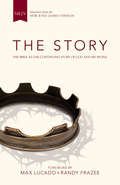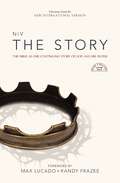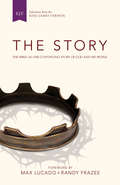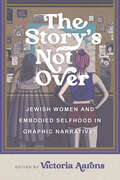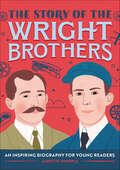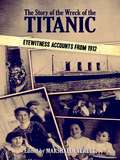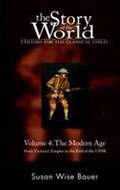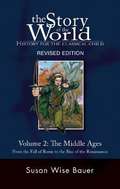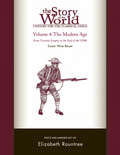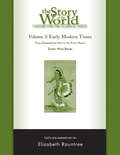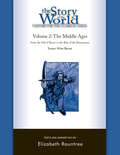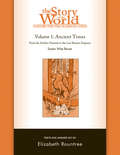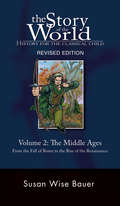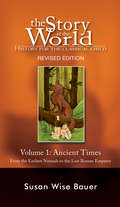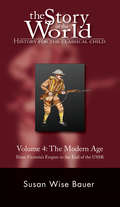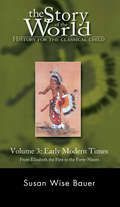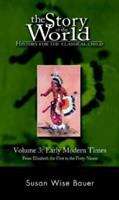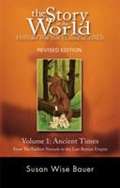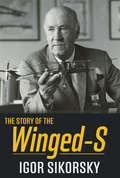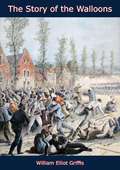- Table View
- List View
The Story, NKJV: The Bible as One Continuing Story of God and His People
by Max Lucado Randy Frazee“THE GREATEST STORY EVER TOLD” IS MORE THAN JUST A CLICHÉ. God goes to great lengths to rescue lost and hurting people. That is what The Story is all about: the story of the Bible, God’s great love affair with humanity. Condensed into 31 accessible chapters, The Story sweeps you into the unfolding progression of Bible characters and events from Genesis to Revelation. Using the classic, yet updated text of the New King James Version Bible, it allows the stories, poems, and teachings of the Bible to read like a novel. And like any good story, The Story is filled with intrigue, drama, conflict, romance, and redemption; and this story’s true! From the foreword by Max Lucado and Randy Frazee: “This book tells the grandest, most compelling story of all time: the story of a true God who loves his children, who established for them a way of salvation and provided a route to eternity. Each story in these 31 chapters reveals the God of grace—the God who speaks; the God who acts; the God who listens; the God whose love for his people culminated in his sacrifice of Jesus, his only Son, to atone for the sins of humanity.” Features: • The story of the Bible—in its own words. Selections from the NIV Bible with short transitions to connect the reader to the continuing story. • Events, characters, and teachings of the Bible arranged chronologically • Timelines of Bible events • New King James Bible text Church families around the globe can now embrace The Story for a full ministry year through worship services, small group studies, and family activities. Learn more about this whole-church experience at TheStory.com. An excerpt from The Story: After Judas left, Jesus gave the disciples a glimpse of what was to come. He foreshadowed the fact that he was going to be “broken” and “poured out”—he was going to take humanity’s punishment for sin on himself. While they were eating, Jesus took bread, and when he had given thanks, he broke it and gave it to his disciples, saying, “Take and eat; this is my body.” Then he took a cup, and when he had given thanks, he gave it to them, saying, “Drink from it, all of you. This is my blood of the covenant, which is poured out for many for the forgiveness of sins. I tell you, I will not drink from this fruit of the vine from now on until that day when I drink it new with you in my Father’s kingdom.” Jesus warned his disciples that he would be with them only a little while longer. He went on to comfort his confused followers. “Do not let your hearts be troubled. You believe in God; believe also in me. My Father’s house has many rooms; if that were not so, would I have told you that I am going there to prepare a place for you? And if I go and prepare a place for you, I will come back and take you to be with me that you also may be where I am. You know the way to the place where I am going.” Thomas said to him, “Lord, we don’t know where you are going, so how can we know the way?” Jesus answered, “I am the way and the truth and the life. No one comes to the Father except through me. If you really know me, you will know my Father as well. From now on, you do know him and have seen him.”
The Story, NIV: The Bible as One Continuing Story of God and His People (The\story Ser.)
by Max Lucado Randy Frazee“The Greatest Story Ever Told” is more than just a cliché. God has gone to great lengths to rescue lost and hurting people. That is what The Story is all about: the story of the Bible, God’s great love affair with humanity. Condensed into 31 accessible chapters—and using the clear, accessible text of the NIV—this rendering of the Bible allows its stories, poems, and teachings to come together in a single, compelling read. The Story sweeps you into the unfolding grand narrative of the Scriptures, and like any good story, it is filled with intrigue, drama, conflict, romance, and redemption. From the foreword by Max Lucado and Randy Frazee: “This book tells the grandest, most compelling story of all time: the story of a true God who loves his children, who established for them a way of salvation and provided a route to eternity. Each story in these 31 chapters reveals the God of grace—the God who speaks; the God who acts; the God who listens; the God whose love for his people culminated in his sacrifice of Jesus, his only Son, to atone for the sins of humanity.” NIV ©2011. The New International Version (NIV) translation of the Bible is the world’s most popular modern-English Bible—easy to understand, yet rich with the detail found in the original languages.
The Story, KJV: The Bible as One Continuing Story of God and His People
by Max Lucado Randy Frazee“THE GREATEST STORY EVER TOLD” IS MORE THAN JUST A CLICHÉ. God goes to great lengths to rescue lost and hurting people. That is what The Story is all about: the story of the Bible, God’s great love affair with humanity. Condensed into 31 accessible chapters, The Story sweeps you into the unfolding progression of Bible characters and events from Genesis to Revelation. Using the timeless, classic text of the King James Version Bible, it allows the stories, poems, and teachings of the Bible to read like a novel. And like any good story, The Story is filled with intrigue, drama, conflict, romance, and redemption; and this story’s true! From the foreword by Max Lucado and Randy Frazee: “This book tells the grandest, most compelling story of all time: the story of a true God who loves his children, who established for them a way of salvation and provided a route to eternity. Each story in these 31 chapters reveals the God of grace—the God who speaks; the God who acts; the God who listens; the God whose love for his people culminated in his sacrifice of Jesus, his only Son, to atone for the sins of humanity.” Features: • The story of the Bible—in its own words. Selections from the KJV Bible with short transitions to connect the reader to the continuing story. • Events, characters, and teachings of the Bible arranged chronologically • Timelines of Bible events • King James Bible text Church families around the globe can now embrace The Story for a full ministry year through worship services, small group studies, and family activities. Learn more about this whole-church experience at TheStory.com. An excerpt from The Story: After Judas left, Jesus gave the disciples a glimpse of what was to come. He foreshadowed the fact that he was going to be “broken” and “poured out”—he was going to take humanity’s punishment for sin on himself. While they were eating, Jesus took bread, and when he had given thanks, he broke it and gave it to his disciples, saying, “Take and eat; this is my body.” Then he took a cup, and when he had given thanks, he gave it to them, saying, “Drink from it, all of you. This is my blood of the covenant, which is poured out for many for the forgiveness of sins. I tell you, I will not drink from this fruit of the vine from now on until that day when I drink it new with you in my Father’s kingdom.” Jesus warned his disciples that he would be with them only a little while longer. He went on to comfort his confused followers. “Do not let your hearts be troubled. You believe in God; believe also in me. My Father’s house has many rooms; if that were not so, would I have told you that I am going there to prepare a place for you? And if I go and prepare a place for you, I will come back and take you to be with me that you also may be where I am. You know the way to the place where I am going.” Thomas said to him, “Lord, we don’t know where you are going, so how can we know the way?” Jesus answered, “I am the way and the truth and the life. No one comes to the Father except through me. If you really know me, you will know my Father as well. From now on, you do know him and have seen him.”
The Story's Not Over: Jewish Women and Embodied Selfhood in Graphic Narratives
by Leela CormanExamining through text and image what it means to be a woman, a Jew, and an artist. This comprehensive collection considers Jewish women graphic novelists and the richly figured ways in which Jewish identity is complicated by gender, memory, generation, and place: the spaces—emotional, geographical, psychological—that women inhabit. Through the intersections and juxtapositions of word and image, authors capture the complexities and anxieties of gender and Jewishness in navigating memory, identity, and embodied self-expression. Jewish women graphic novelists are preoccupied often with embodied memory, memories of loss, memories of personal and collective histories, and memories of transformative moments of self-reinvention. Here, memory materializes in the drawn shape of the body as an expression of the weight of personal and collective histories. The innovative and fluid conventions of graphic narrative panels, gutters, spaces of separation, bleeds, and juxtapositions of text and image embody the self. The diverse forms and structures of graphic narratives discussed in this volume by a range of international scholars demonstrate the ways in which Jewish women's graphic narratives reach into the past by way of stories and histories, both individual and collective, that provide a touchstone for the shape of identity.
The Story of the Wright Brothers: An Inspiring Biography for Young Readers (The Story of Biographies)
by Annette WhippleDiscover the lives of Wilbur and Orville Wright—a story for kids 6 to 9 about making ideas take flightThe Wright brothers were the first people ever to build and fly an airplane, doing what many people at the time didn't think was possible. Before they made history with their airplane, Wilbur and Orville were curious kids who loved learning about the world around them and how it worked. They fell in love with the idea of flying and taught themselves everything they needed to know to make their dream come true. How will their hard work and big imaginations inspire you?Independent reading—This Wright brothers biography is broken down into short chapters and simple language so kids 6 to 9 can read and learn on their own.Critical thinking—Kids will learn the Who, What, Where, When, Why, and How of the Wright brothers' lives, find definitions of new words, discussion questions, and more.A lasting legacy—Explore how the Wright brothers went from young boys growing up in Ohio to world-famous inventors, aviators, and businessmen.See Wilbur and Orville bring their dreams to life in this fun and colorful biography for kids.Discover activists, artists, athletes, and more from across history with the rest of the Story Of series, including famous figures like: Marie Curie, Amelia Earhart, Albert Einstein, Neil Armstrong, and Jane Goodall.
The Story of the Wreck of the Titanic: Eyewitness Accounts from 1912 (Dover Maritime Series)
by Marshall EverettPublished in the immediate wake of the famous maritime disaster, this "graphic and thrilling account of the sinking of the greatest Floating Palace ever built" sold briskly to an eager public. A century later, its tragic tale continues to captivate readers. These contemporary reports describe the luxury liner, its passengers, and the circumstances of the wreck. Gripping narratives by survivors recount episodes of heroism and cowardice along with dramatic rescues and moving incidents of self-sacrifice. In addition to chronicling the wide-ranging outpouring of grief and the establishment of many memorials, this fascinating compilation presents expert analysis of the shipwreck's causes and the findings of a Senate investigation convened to determine responsibility for the catastrophe. Historic photographs and specially commissioned drawings appear throughout the book.
The Story of the World: The Modern Age, From Victoria's Empire to the End of the USSR
by Susan Wise BauerThe book contains a chronological history of the modern age, from 1850 to 2000.
The Story of the World: The Middle Ages, From the Fall of Rome to the Rise of the Renaissance (Revised Edition)
by Susan Wise Bauer"The Story of the World" covers the sweep of human history from ancient times until the present. Africa, China, Europe, the Americas--find out what happened all around the world in long-ago times. Designed as a read-aloud project for parents and children to share together, "Volume 2: The Middle Ages," is the second of a four-volume series and covers the major historical events in the years 400 to 1600 CE, as well as including maps, illustrations, and tales from each culture.
The Story of the World: Tests and Answer Key (Vol. 4) (Story of the World)
by Susan Wise Bauer Elizabeth RountreeHistory has been taught in a boring way for far too long. A subject as moving and powerful as humanity's past should be inviting, and when it is told well, it is. Susan Wise Bauer succeeds in telling the captivating story of history with her best-selling history series. Parents and young readers have fallen in love with her narrative history, The Story of the World, and its accompanying Activity Book. Now teachers and home educators can take advantage of a new and valuable learning tool: the Tests and Answer Key package. Included are 42 tests: one for each chapter of The Story of the World. Perfect for evaluating comprehension and retention. The narrative format of The Story of the World helps children remember the famous people, places, and events in history. These tests offer you an easy way to make sure that your child is absorbing the important events from world history. A combination of multiple choice, matching, fill-in-the-blank, and short writing samples allow you to evaluate your child's retention and comprehension of key events in The Story of the World. The Tests package contains an answer key for all tests. These easy-to-use tests and answer keys, successfully used by hundreds of parents and teachers, provide an objective method for measuring retention of key facts, figures, and events from history. A combination of sequencing, matching, short-answer, and essay-style questions gives students a chance to show what they've learned. Used with The Story of the World Text Book and Activity Book (sold separately), the Test and Answer Key gives educators a complete history curriculum for their elementary school students.
The Story of the World: Tests and Answer Key (Vol. 3) (Story of the World)
by Susan Wise Bauer Elizabeth RountreeHistory has been taught in a boring way for far too long. A subject as moving and powerful as humanity's past should be inviting, and when it is told well, it is. Susan Wise Bauer succeeds in telling the captivating story of history with her best-selling history series. Parents and young readers have fallen in love with her narrative history, The Story of the World, and its accompanying Activity Book. Now teachers and home educators can take advantage of a new and valuable learning tool: the Tests and Answer Key package. Included are 42 tests: one for each chapter of The Story of the World. Perfect for evaluating comprehension and retention. The narrative format of The Story of the World helps children remember the famous people, places, and events in history. These tests offer you an easy way to make sure that your child is absorbing the important events from world history. A combination of multiple choice, matching, fill-in-the-blank, and short writing samples allow you to evaluate your child's retention and comprehension of key events in The Story of the World. The Tests package contains an answer key for all tests. These easy-to-use tests and answer keys, successfully used by hundreds of parents and teachers, provide an objective method for measuring retention of key facts, figures, and events from history. A combination of sequencing, matching, short-answer, and essay-style questions gives students a chance to show what they've learned. Used with The Story of the World Text Book and Activity Book (sold separately), the Test and Answer Key gives educators a complete history curriculum for their elementary school students.
The Story of the World: Tests and Answer Key (Vol. 2) (Story of the World)
by Susan Wise Bauer Elizabeth RountreeHistory has been taught in a boring way for far too long. A subject as moving and powerful as humanity's past should be inviting, and when it is told well, it is. Susan Wise Bauer succeeds in telling the captivating story of history with her best-selling history series. Parents and young readers have fallen in love with her narrative history, The Story of the World, and its accompanying Activity Book. Now teachers and home educators can take advantage of a new and valuable learning tool: the Tests and Answer Key package. Included are 42 tests: one for each chapter of The Story of the World. Perfect for evaluating comprehension and retention. The narrative format of The Story of the World helps children remember the famous people, places, and events in history. These tests offer you an easy way to make sure that your child is absorbing the important events from world history. A combination of multiple choice, matching, fill-in-the-blank, and short writing samples allow you to evaluate your child's retention and comprehension of key events in The Story of the World. The Tests package contains an answer key for all tests. These easy-to-use tests and answer keys, successfully used by hundreds of parents and teachers, provide an objective method for measuring retention of key facts, figures, and events from history. A combination of sequencing, matching, short-answer, and essay-style questions gives students a chance to show what they've learned. Used with The Story of the World Text Book and Activity Book (sold separately), the Test and Answer Key gives educators a complete history curriculum for their elementary school students.
The Story of the World: Tests and Answer Key (Vol. 1) (Story of the World)
by Susan Wise Bauer Elizabeth RountreeHistory has been taught in a boring way for far too long. A subject as moving and powerful as humanity's past should be inviting, and when it is told well, it is. Susan Wise Bauer succeeds in telling the captivating story of history with her best-selling history series. Parents and young readers have fallen in love with her narrative history, The Story of the World, and its accompanying Activity Book. Now teachers and home educators can take advantage of a new and valuable learning tool: the Tests and Answer Key package. Included are 42 tests: one for each chapter of The Story of the World. Perfect for evaluating comprehension and retention. The narrative format of The Story of the World helps children remember the famous people, places, and events in history. These tests offer you an easy way to make sure that your child is absorbing the important events from world history. A combination of multiple choice, matching, fill-in-the-blank, and short writing samples allow you to evaluate your child's retention and comprehension of key events in The Story of the World. The Tests package contains an answer key for all tests. These easy-to-use tests and answer keys, successfully used by hundreds of parents and teachers, provide an objective method for measuring retention of key facts, figures, and events from history. A combination of sequencing, matching, short-answer, and essay-style questions gives students a chance to show what they've learned. Used with The Story of the World Text Book and Activity Book (sold separately), the Test and Answer Key gives educators a complete history curriculum for their elementary school students.
The Story of the World: From the Fall of Rome to the Rise of the Renaissance (Second Revised Edition) (Vol. 2) (Story of the World)
by Susan Wise BauerThis second book in the four-volume narrative history series for elementary students will transform your study of history. The Story of the World has won awards from numerous homeschooling magazines and readers' polls--over 150,000 copies of the series in print! Now more than ever, other cultures are affecting our everyday lives--and our children need to learn about the other countries of the world and their history. Susan Wise Bauer has provided a captivating guide to the history of other lands. Written in an engaging, straightforward manner, this revised edition of The Story of the World: History for the Classical Child, Volume 2: The Middle Ages weaves world history into a story book format. Who discovered chocolate? What happened to the giant Fovor of the Mighty Blows? Why did the Ottoman Turks drag their war ships across dry land? The Story of the World covers the sweep of human history from ancient times until the present. Africa, China, Europe, the Americas--find out what happened all around the world in long-ago times. Designed as a read-aloud project for parents and children to share together, The Story of the World includes each continent and major people group. Volume 2: The Middle Ages, is the second of a four-volume series and covers the major historical events in the years 400 to 1600 CE, as well as including maps, illustrations, and tales from each culture. Each Story of the World volume provides a full year of history study when combined with the Activity Book, Audiobook, and Tests--each available separately to accompany each volume of The Story of the World Text Book. Volume 2 Grade Recommendation: Grades 1-6.
The Story of the World: From the Earliest Nomads to the Last Roman Emperor (Revised Second Edition) (Vol. 1) (Story of the World)
by Susan Wise BauerThis first book in the four-volume narrative history series for elementary students will transform your study of history. The Story of the World has won awards from numerous homeschooling magazines and readers' polls--over 150,000 copies of the series in print! What terrible secret was buried in Shi Huangdi's tomb? Did nomads like lizard stew? What happened to Anansi the Spider in the Village of the Plantains? And how did a six-year-old become the last emperor of Rome? Told in a straightforward, engaging style that has become Susan Wise Bauer's trademark, The Story of the World series covers the sweep of human history from ancient times until the present. Africa, China, Europe, the Americas--find out what happened all around the world in long-ago times. This first revised volume begins with the earliest nomads and ends with the last Roman emperor. Newly revised and updated, The Story of the World, Volume 1 includes maps, a new timeline, more illustrations, and additional parental aids. This read-aloud series is designed for parents to share with elementary-school children. Enjoy it together and introduce your child to the marvelous story of the world's civilizations. Each Story of the World volume provides a full year of history study when combined with the Activity Book, Audiobook, and Tests--each available separately to accompany each volume of The Story of the World Text Book. Volume 1 Grade Recommendation: Grades 1-5.
The Story of the World: From Victoria's Empire to the End of the USSR (Vol. 4) (Story of the World)
by Susan Wise BauerThis fourth book in the four-volume narrative history series for elementary students will transform your study of history. The Story of the World has won awards from numerous homeschooling magazines and readers' polls--over 150,000 copies of the series in print! Where was the Crystal Palace? Who was the Sick Man of Europe? And how did cow fat start a revolution? Now more than ever, other countries and customs affect our everyday lives--and our children need to learn about the people who live all around the world. Susan Wise Bauer has provided a captivating guide to the history of modern nations all around the world. Written in an engaging, straightforward manner, the final volume of the popular Story of the World series weaves world history into a storybook format, covering major historical events in the years 1850-2000. From the Middle East and China to Africa and the Americas--find out what happened all around the world in the last century and a half. Designed as a read-aloud project for parents and children to share together, The Story of the World includes the stories of each continent and people group. Each Story of the World volume provides a full year of history study when combined with the Activity Book, Audiobook, and Tests--each available separately to accompany each volume of The Story of the World Text Book. Volume 4 Grade Recommendation: Grades 3-8.
The Story of the World: From Elizabeth the First to the Forty-Niners (Vol. 3) (Story of the World)
by Susan Wise BauerThis third book in the four-volume narrative history series for elementary students will transform your study of history. The Story of the World has won awards from numerous homeschooling magazines and readers' polls--over 150,000 copies of the series in print! Now more than ever, other cultures are affecting our everyday lives--and our children need to learn about the other countries of the world and their history. Susan Wise Bauer has provided a captivating guide to the history of other lands. Written in an engaging, straightforward manner, The Story of the World: History for the Classical Child; Volume 3: Early Modern Times weaves world history into a story book format. Who was the Sun King? Why did the Luddites go around England smashing machines? And how did samurai become sumo wrestlers? The Story of the World covers the sweep of human history from ancient times until the present. Africa, China, Europe, the Americas--find out what happened all around the world in long-ago times. Designed as a read-aloud project for parents and children to share together, The Story of the World includes each continent and major people group. Volume 3: Early Modern Times is the third of a four volume series and covers the major historical events in the years 1600 to 1850, as well as including maps, illustrations, and tales from each culture. Each Story of the World volume provides a full year of history study when combined with the Activity Book, Audiobook, and Tests--each available separately to accompany each volume of The Story of the World Text Book. Volume 3 Grade Recommendation: Grades 3-8.
The Story of the World: Early Modern Times, From Elizabeth the First to the Forty-niners
by Susan Wise BauerNow more than ever, other cultures are affecting our every day lives and our children need to learn about the other countries of the world and their history. Susan Wise Bauer has provided a captivating guide to the history of other lands. Written in an engaging,straightforward manner, The Story of the World: History for the Classical Child; Volume 3: Early Modern Times weaves world history into a story book format. Who was the Sun King? Why did the Luddites go-around England smashing machines? And how did samurai become sumowrestlers? The Story of the World covers the sweep of human history from ancient times until the present. Africa, China,Europe, the Americas-find out what happened all around the world in long-ago times. Designed as a read-aloud project for parents and children to share together, The Story of the World includes each continent and major people group. Volume 3: Early Modern Times is the third of a four volume series and covers the major historical events in the years 1600 to 1850, as well as including maps,illustrations, and tales from each culture. Each Story of the World volume provides a full year of history study when combined with the Activity Book, Audiobook, and Tests-each available separately to accompany each volume of The Story of the World Text Book. Volume 3 Grade Recommendation: Grades 3-8.
The Story of the World: Ancient Times, From the Earliest Nomads to the Last Roman Emperor (2nd Edition)
by Susan Wise BauerThis first revised volume begins with the earliest nomads and ends with the last Roman emperor. Newly revised and updated, The Story of the World, Volume 1 includes maps, a new timeline, more illustrations, and additional parental aids.
The Story of the World Cup
by Richard BrasseyThis is a colourful history of the World Cup from the author of THE STORY OF THE OLYMPICS.From the first tournament in Uruguay to England's legendary 1966 win and beyond, with red cards, penalty shoot-outs and goals galore, there are fun facts football fans can use to impress their family and friends. This book will delight fans of all ages, and is great value for money at £4.99 in full colour.This fun and fascinating exploration of the history of the World Cup is perfect for football fans everywhere.
The Story of the Women's Movement (Cornerstones of Freedom)
by Maureen AshA brief history of how women in this country have tried to gain equal rights with men.
The Story of the Winged S: An Autobiography (American Autobiography Ser.)
by Igor SikorskyThe Story of the Winged-S, first published in 1938, is the autobiography of aviation pioneer Igor Sikorsky (1889-1972). The author looks traces the development of his many ground-breaking fixed-wing aircraft and helicopter designs during his long career in Russia, Europe and the United States. Included are 40 pages of illustrations.
The Story of the Walloons: At Home In Lands Of Exile And In America
by William Elliot GriffisTHE first permanent settlers who, in any number, came with wives and children to make homes and to till the soil in New York, New Jersey, Pennsylvania, and Delaware were Walloons, or French-speaking people, from the Belgic Netherlands.Who were they, and why did they come?Few people from northern Europe, three hundred years ago, wanted to go and live in America, when it was a howling wilderness full of savage beasts and men. A great, wide, stormy ocean had first to be crossed, and many who made the attempt died on the way or were massacred when on land. In most cases, colonization meant starvation.So it was that before men would come with families to what is now the best of all countries, they had to be pushed or driven out from their home lands, like fledglings from the nest. Cruel kings or church rulers must force them to leave their own towns and cities, houses and gardens, before they could think of exile. With most of the first pioneers, it was a choice between prison and torture, being burned alive, or having their heads chopped off.
The Story of the Vietnam Veterans Memorial (Cornerstones of Freedom)
by David K. WrightThe behind-the-scenes story of how and why the Vietnam Veterans Memorial was built in Washington, D.C.
The Story of the Unification of Germany (Cornerstones of Freedom)
by Jim HargroveDiscusses the historical background and events leading up to the reunification of a divided Germany and the political and economic ramifications.
The Story of the Underground Railroad (Cornerstones of Freedom)
by R. Conrad SteinDiscusses the network of groups and individuals throughout Ohio and the New England states who aided slaves escaping from their captivity during the nineteenth century.
